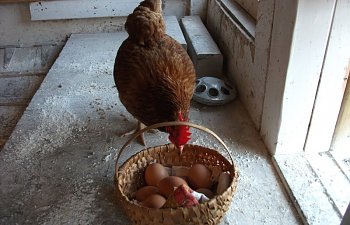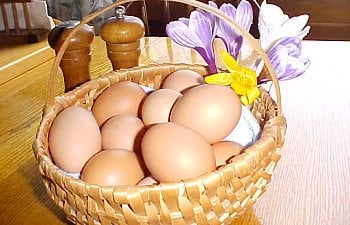
One of the most important aspects of hygiene is providing adequate ventilation. Since we have lots of space overhead in the coop (8') and can vent moist air into a loft space then outdoors, this part is covered. Otherwise, you will need vents at the top of the coop, preferably the kind that can be closed if you experience winter weather. All of us need effective window ventilation. We came up with this homemade design which uses plexiglass (safer) and hardware cloth to protect our hens against predators. If you use the deep litter method of bedding ventilation issues become critical. We opted not to, using shavings on planks over concrete. Most of our manure gets scraped off platforms and there is little odor thanks to good airflow.
First Aid
I have a medium-sized dog crate (wire) with a cloth cover and metal pan;
can use at house or in barn feed room which is constructed so barn cats can't access;
ceramic heater
water source
magnifying glass
clean rags
cotton balls
needle/thread
rubbing alcohol
tincture of iodine
electrolytes on hand, also vitamins
apple cider vinegar
olive oil
sugar
electrolytes with antibiotics would only use in certain circumstances
q-tips
eye droppers
latex gloves
blue lotion
molasses
particulate dust mask ( this is for me, on cleanup days)
Biosecurity
I'd like to share a simple idea about eliminating 6 and 8-legged pests from the moment a coop is built, or given a thorough cleaning. Consider investing in a no-pest strip. Such strips are made of wax impregnated with pyrethrins. Made by Vapona, Black Flag, Home Hardware, and under various generic labels. These strips can be hung high in a coop or can be shielded from the birds using hardware cloth or metal screening. Avoid placing over food or water. They kill fleas, ticks, lice, mites, ticks, gnats, and most flies. As a preventive, they are unsurpassed and will decrease the need for dusting or spraying birds directly. Available at most hardware stores, tack shops, co-ops, feed stores, and agricultural supply houses. Uses in coops, barns, restaurants, hospitals, and homes. Added bonus- no fleas in your house, even if you use them regularly. Last 3 months. Cost about $10.
When I returned to the hardware store the next time to replace a strip, the manufacturer had begun to use dichlorvos. This means I use the strip in the porch of the coop rather than with the birds directly, but since I have food-grade DE and Stable Boy powder in the bedding, it's only a slight change, and the new ones last 4 months.
Recently a large shipper of chicks experienced a major problem and diseased chicks entered many backyard flocks, at times contaminating the existing adults, though most owners saw the problem and were able to check the spread. For others, sadly, deaths and euthanasia became a priority, and vets and government officials became involved. Knowledgeable poultry owners quarantine new birds and many of us operate closed flocks, in which a group of birds enter new premises and remain with only those birds for the duration.
Whether you keep chickens or other livestock, hygiene may be as simple as washing your hands between the handling of say, brooder chicks and the touching of existing animals. If you know an individual is ill, both medications and disinfectants may be needed, and all materials that come in contact will have to be cleaned or in some cases, destroyed. Sometimes when you lose an animal you must do more than compost the body and you need to become informed. A sink in the coop would be a real treasure, but few of us have one. It's something we may be able to add to our barn if we can figure out how to keep the drain from freezing.
There are a lot of issues surrounding coop hygiene and one of the easiest things we can do is to wash our barn clothes regularly, especially when we know there is trouble. Gloves can be a problem and it helps to have a kind that can be wiped down easily or to keep some latex or plastic gloves on hand for situations involving extreme care. If you have a convenient hose or wash tray for boots, you can keep what's in the coop from getting anywhere else, and other things from getting to the coop. You may need a disinfectant from time to time, too.
Look at it this way- what if you get new birds someday that seem okay but are diseased or contaminated in some way? Would you risk infecting the birds you have? Without a plan, every new bird becomes a possible source of trouble. Even worse, with the government peering into backyard coops, the introduction of certain diseases could mean your whole flock could be forcibly culled. How awful.
You might need an isolation cage or coop, it's something to plan for before you have trouble. Choose something that can be disinfected.
We spot clean our coop every day. Some owners use the deep litter method but we prefer the regular removal of droppings. Our time with horses, dogs, and cats has opened our eyes, you can bet on that! Oddly, something like horse manure can prevent fleas and ticks on other mammals, so that's a discrepant way of looking at things. The ferals that use the barn are litter trained and that makes a huge difference!
We've decided that any implements we use in the coop will never be used in other parts of the barn, to prevent the spread of viruses and bacteria. The porch on the aisleway side of the coop now has coat hooks and other hangers where we can keep a whisk broom, a scraper, buckets, kitty litter scoop, a first aid bag, and other things that are for the birds only. Feed will be kept in the feed room in rodent-proof containers, no loose bags open or not are ever kept in our barn.
The cleanest agricultural operation I have seen is a pig operation near here. Hard to believe, right! No smells to irritate the district, disinfectant trays for boots, face masks, and the workers can be in only one barn or part of the barn, no exceptions. On-site laundry- amazing. naturally, they have the lowest disease rate in the province. I wasn't allowed in with the piglets, I had to see these things through a window...

It's important to design your coop in such a way that panels can be unscrewed to inspect wall cavities for pests, and you want to do this so that you don't damage your materials. In cold climates, insulation is a must, and you can use the fiberglass/vapor seal/duct tape method with screwed (not nailed) panels. Another thing you can do is to caulk cracks and seams, and there are products that can easily be peeled away if you have to open a section of the wall. Read the instructions though, you should not apply these with birds nearby.

Caulking is a concern. Sometimes you can caulk from the backside of a panel if it's under construction and there are products like Draft-Stop that can be peeled away if you ever have to remove a section. If you have to caulk on the chicken side, try to do it before you prime and paint and check for loose bits so you can use a razor or something to avoid ends that the chickens can grab. We used latex to minimize toxic influence.
Nothing teaches you more about barn hygiene than horses and feral cats, IMHO. The horses because of the sheer magnitude of manure and the gigantic wet spots, and the ferals because of the rather unique, um, scent (especially toms). Well, I admit to being tired of carting horse manure, to the point where I have moved some of my vegetable garden to the manure pile instead of moving the manure uphill to the garden. It is a matter of pride that all the ferals use one of six litter boxes I clean daily and that even the occasional visitors conform to feral colony rules. Long ago I met a man who had a litter-trained rooster who lived in his kitchen, but I bet most of us don't have chickens who act like that.
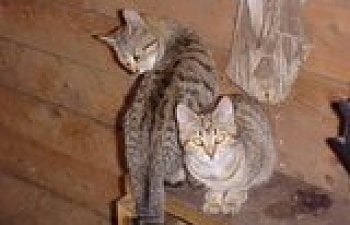
I have heard that chickens require special attention to ammonia and dust. Since I will be raising day-old chicks and keeping 12 hens, with any luck, I want to start out well.
The owner of the co-op sold me one of his 50 lb. bags of diatomaceous earth (DE) after I noted that it wasn't on his price list. He brings it in by the one-ton pallet and has agreed to see it to me when I need some. He has huge flocks and uses them to start new stock by dusting all cracks and anything that might harbor parasites. This I can do, the coop has never been used for birds to my knowledge since the barn was built in the mid-1970s. The bag that I bought in May 0f 2008 will last until May 2010 so even at $51 Cdn is was a good buy.
'Stable Boy', a deodorizer I have used for horses and cats, and which the co-op owner also uses liberally with his poultry. This has stopped the ammonia. If I scrape the shelf daily into a cleaning bucket, hopefully, the ammonia won't build. The DE and Stable Boy can also be used on the floor planks and in the nesting boxes. Update- didn't install the dropping board because the birds like to use the roosts for a little while after supper for grooming and gossip before moving to a platform over the nest boxes. I prefer spot-cleaning to deep litter method so I have no buildup of manure and gasses and I never have to clean the coop down- it stays dry and nearly odor-free.
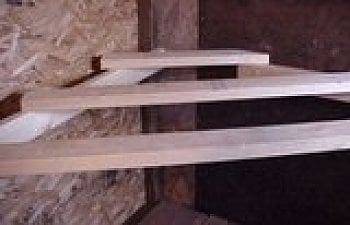
This is one of the layers, Maggie, checking the first eggs of the day- November 9, 2009. The powder on the platform is food-grade diatomaceous earth, used every few days near the pop hole, entrances, roosts, and perimeter as a preventive to lice, ticks, and mites and as a general desiccant.
By the way, if you use shavings in the coop and discover that some bales are extra-heavy, they are probably filled with sawdust, from the end of a run at the mill. Next time, ask to put them back and get bales of average weight, and you'll have less dust in the coop. And once or twice a year I shoo the hens out into the run and close the pop door so that I can use the shop vac to get rid of grooming dust, spider webs, and debris in nooks and crannies.
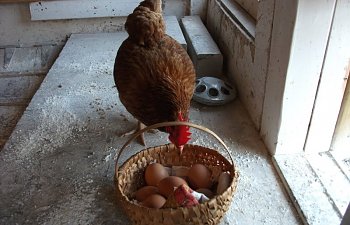
This is what the platform looks like after they have roosted overnight.
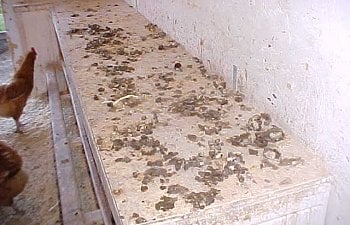
The droppings have some food-grade diatomaceous earth underneath and some leftover seed from wild birdseed treats. I use a paint scraper and a catch bucket to clean up daily, getting most of the droppings that would dampen or foul the coop.
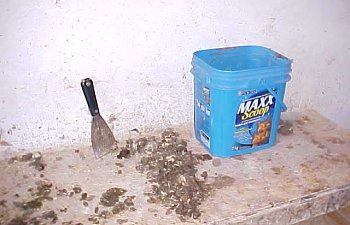
I like the rectangular bucket because it eases up to the flat edges of the platform without spillage. We dump in a seasonal compost pit.
Most lime or limestone garden products are alkaline and are designed to neutralize soil acids (sweeten soil). They will burn and I can only imagine the horror of destroying the skin on the feet of chickens. I also avoid masonry products like mortar and quickline. These are so alkaline that in Canada they have one of the highest ratings on the containers for hazardous materials. You must also check agricultural limes- some are awful but should be labeled.
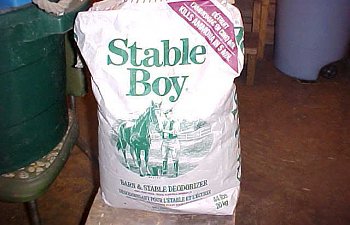
Another item we use is a pest strip to kill flies. We don't have major problems because most of the biting flies will not remain in the shade of a barn, but in August or September, we might hand a pyrethrin wax strip called a 'Black Flag' or Vapona No-Pest Strip. It's good for three months, can be hung over poultry (avoid directly over food/water), and will work on most kinds of insect parasites. Be sure to check any rain barrels of other collection dishes that hold liquids for mosquito larvae- change water as often as you feasibly can!
Food storage is a critical subject too. We've had success with Rubbermaid (and other brands of) wheeled covered rubbish containers. Others suggest galvanized steel which is chew-proof. Because we've been rat-free for 21 years we are able to use plastic. Whichever you choose, keeping food from contamination and any kind of spoilage is vital. If a bag gets wet and you can't use the feed immediately, you may have to get rid of it. And remember not to dump bad food near the coop, or you may attract rodents. If you need them raccoon straps are available at hardware stores. Never use feed that has gotten damp or moldy. If a feed source has had moisture problems from leakage or flooding, reconsider buying even if the feed seems dry- spores can collect along seams and in the bottom and poison your birds before you know the cause.

